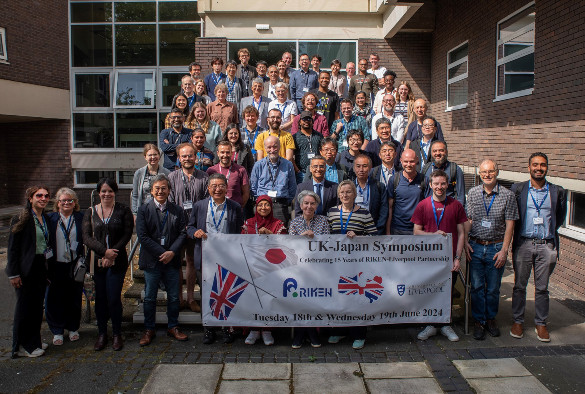A two-day symposium on the Frontiers of Structural Biology was held in Liverpool earlier this month to celebrate 15 years of the RIKEN-Liverpool partnership.
RIKEN is Japan’s largest comprehensive research institution renowned for high-quality research in a diverse range of scientific disciplines.
The symposium brought together 28 leading experts from Japan and the UK covering all frontier structural biology methods such as synchrotron and XFEL based X-ray crystallographic techniques, neutron crystallography and cryo electron microscopy (cryoEM).
The symposium demonstrated the power of this expanding toolbox of structural biology in providing unprecedented insight into the assembly and organisation of multi-protein biological machineries as well as their utilisation in bringing highly effective drugs into the market.
Several speakers from Japan came from the Harima campus that hosts RIKEN-SPring-8 centre with whom the University had signed a Memorandum of Understanding in 2009 before entering a RIKEN-wide agreement in 2010. In addition, speakers came from Kyoto, Osaka and Okayama universities as well several premier research institutes in Japan. On the UK side, in addition to Liverpool, speakers came from Cambridge, Leicester, Oxford, the Rosalind Franklin Institute and the DIAMOND light source.
One of the highlights was a public lecture from Richard Henderson, winner of the Nobel Prize for Chemistry in 2017, who explored the revolution brought about by the developments in cryoEM and argued that its wider availability would accelerate the pace of structural biology research which is hugely important for a number of research endeavours – not least the development of pharmaceuticals.
Commenting on the RIKEN-Liverpool partnership, Richard Henderson said: “I am hopeful that this strong relationship will continue, particularly as the University has a well-established link with RIKEN which is Japan’s largest comprehensive research institution renowned for high-quality research in a diverse range of scientific disciplines with a network of world-class research centres across Japan, offering state-of-the-art facilities and cutting-edge technology.”
University of Liverpool Vice-Chancellor Professor Tim Jones said, “We are very proud, here at Liverpool, of our long-standing collaboration with RIKEN and I am so pleased that this symposium has provided the opportunity to celebrate our 15 years of partnership. We look forward to further strengthening and broadening that collaboration across both the University of Liverpool and RIKEN over the years to come. Whilst talking about important partners for the University, it would be remiss not to mention various collaborations that we have with Kyoto University and Osaka University. We look forward to strengthening these further as well as establishing partnerships with other premier universities and institutions from Japan that have contributed to the success of this symposium.”
While opening the symposium, Professor Tariq Ali, Pro-Vice-Chancellor for Global Engagement and Partnerships at the University of Liverpool, also highlighted the strong strategic partnership between the two countries and his wish to further strengthen partnership with RIKEN and research-intensive universities of Japan.
Professor Samar Hasnain, Max Perutz Professor of Molecular Biophysics at the University of Liverpool, acknowledged that the symposium would not have been possible without the strong backing of Dr Tetsuya Ishikawa, the Director of RIKEN-SPring-8 centre. He said: “It is clear the establishment of a cryo-EM facility at the University would greatly benefit our health and life sciences community and place the University as one of the leading centres in structural biology”.
Professor Tetsuya Ishikawa said: “UoL and RIKEN have maintained a good cooperative relationship for many years. I hope we can continue to develop our partnership so that leads to the visualization of life functions, including cryo-electron microscopy in addition to SPring-8/SACLA.”
